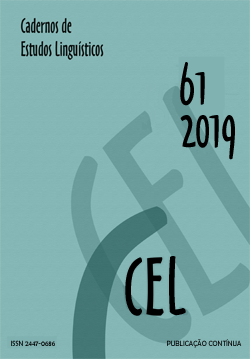Abstract
Paveau (2013a) presents an approach that is, so to speak, innovative, as she aims to give Discourse Analysis a cognitive dimension. Inspired by such a proposition, this article — based on the analysis of an advertising campaign of a Brazilian beer, Skol, for the carnival of 2015 — proposes a discussion about the ethos allying this cognitive-discursive view proposed by the author to the discursive-enunciative one (MAINGUENEAU, 2008a). In order to do that, we mobilize the proposition by Paveau (2015) of integrating the study of moral on language, based on the premise that there are statements acknowledged, within a community, as virtuous or not. Therefore, the members of the community know, due to data socioculturally distributed in the cognitive environment, and have (or should have) a disposition to produce virtuous statements. The author designates this disposition as discursive virtue. We advocate here the ethos may be an index of such virtue and which may, thus, have in its definition a cognitive dimension incorporated, in addition to being regulated, from the strictly enunciative-discursive point of view, by a global semantics (MAINGUENEAU, 2005b). The analysis demonstrates that the ethos that emerges from the advertising campaign indicts a maladjustment in relation to decency (PAVEAU, 2015), since it humiliates — in the sense Paveau (2015) adopts — a certain social group, women.
References
AMOSSY, R. O ethos na intersecção das disciplinas: retórica, pragmática, sociologia dos campos. In: AMOSSY, R. (Org.). Imagens de si no discurso: a construção do ethos. São Paulo: Contexto, 2005, p. 119-144.
CHARAUDEAU, P., MAINGUENEAU, D. Dicionário de análise do discurso. São Paulo: Contexto, 2004.
MAINGUENEAU, D. Análise de textos de comunicação. São Paulo: Cortez, 2002.
MAINGUENEAU, D. Ethos, cenografia, incorporação. In: AMOSSY, R. (Org.). Imagens de si no discurso: a construção do ethos. São Paulo: Contexto, 2005a, p. 69-92.
MAINGUENEAU, D. Gênese dos discursos. Curitiba: Criar, 2005b.
MAINGUENEAU, D. Discurso literário. São Paulo, Contexto: 2006.
MAINGUENEAU, D. A propósito do ethos. In: MOTTA, A. R., SALGADO, L. (Org.). Ethos discursivo. São Paulo: Contexto, 2008a, p. 11-29.
MAINGUENEAU, D. Problemas de ethos. In: MAINGUENEAU, D. Cenas da enunciação. São Paulo: Parábola, 2008b, p. 55-73.
MAINGUENEAU, D. Aforização: enunciados sem texto? In: MAINGUENEAU, D. Doze conceitos em análise do discurso. São Paulo: Parábola, 2010, p. 9-24.
MAINGUENEAU, D. Retorno crítico à noção de ethos. Letras de hoje, v. 53, n. 3, p. 321-330, jul.-set. 2018.
PAVEAU, M. A. Os pré-discursos: sentido, memória e cognição. Campinas: Pontes, 2013a.
PAVEAU, M. A. Memória, des-memória, a-memória: quando o discurso volta-se para seu passado. EID&A - Revista Eletrônica de Estudos Integrados em Discurso e Argumentação, Ilhéus, n. 5, p. 137-161, dez. 2013b.
PAVEAU, M. A. Linguagem e moral: uma ética das virtudes discursivas. Campinas: Editora da Unicamp, 2015.
POSSENTI, S. O sujeito fora do arquivo? In: POSSENTI, S. Os limites do discurso. Curitiba: Criar Edições, 2002, p. 91-103.

This work is licensed under a Creative Commons Attribution-NonCommercial 4.0 International License.
Copyright (c) 2019 Cadernos de Estudos Linguísticos


